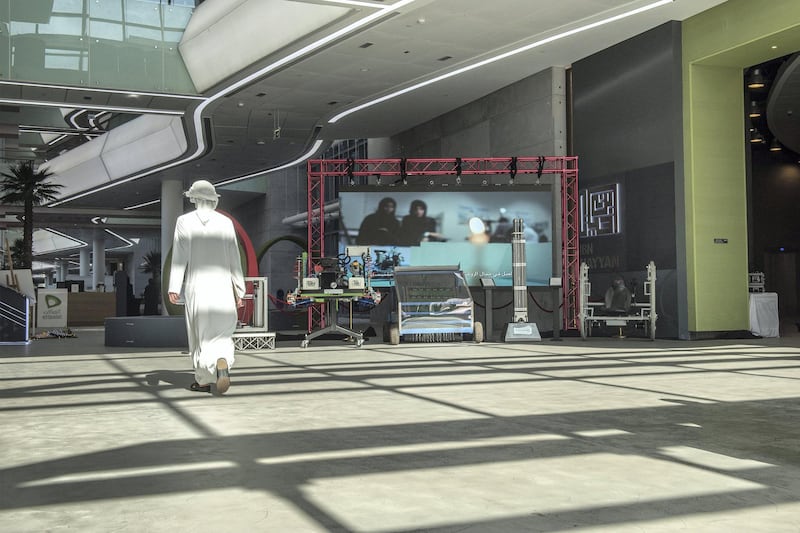Khalifa University of Science and Technology is launching Abu Dhabi's first medical school in September - helping the capital to become a training hub to develop the next generation of doctors.
The facility, which will offer a bridging course allowing students to switch career paths to medicine and an American-style doctor of medicine (MD) programme starting next year, is something the city has been "crying out for", says the president of the university.
The College of Medicine and Health Sciences will be based at the main campus of the university. Students in the medical programme will receive hands-on training at hospitals in Abu Dhabi and will train in clinics from year one. After graduation, students will have the opportunity for residency with a partner hospital in UAE.
“It’s the first medical school in Abu Dhabi city and that is significant. If you look at the healthcare industry growing around here or at the healthcare needs of the population, this is a city that cries out for having its own medical college,” said Dr Tod Laursen, president of Khalifa University.
“Medical centres are important to attract physicians to the societies they are in. The medical profession depends on continuing education and research possibilities for the physicians to be able to retain people. If Abu Dhabi is going to be a destination for top-flight doctors our medical school is part of that story,” said Dr Laursen.
The medical programme will be closely styled along the lines of the American model. In the UK you can start medical school as an undergraduate or join a postgraduate programme. In the US the model is to take Medicine as a post graduate course, including training at hospitals.
A collaborating partner in the US will work with Khalifa University to design and implement the academic programme, in addition to assisting with recruiting and training the academic staff.
In the past, The National has shed light on the need for locally-trained doctors and nurses to cope with ever-increasing healthcare demands.
The UAE's first medical school is The College of Medicine and Health Sciences, part of UAE University, which opened in Al Ain in 1984.
It pioneered public medical education in the emirate and has graduated hundreds medical students since 1993.
The Dubai Medical College has also been undertaking the important task of educating female doctors for the past three decades.
Fiona McKenzie, director of Gabbitas Middle East, an educational consultant based in Dubai, said: “This is a hugely exciting development for Abu Dhabi to have a medical teaching programme which will be training doctors on the ground here. I am sure that there will be strong collaborations between the existing hospitals in Abu Dhabi and the post graduate programme at Khalifa University.
“I think there will be a lot of interest in this MD programme.”
_________
Read more:
[ Abu Dhabi approves merger of universities and billions in projects ]
[ UAE universities achieve highest ever representation in world university rankings ]
[ Khalifa University ranked among Asia's best after merger of Abu Dhabi institutions ]
________
Ms McKenzie says the school will be at the forefront of medical advancement, with students with a background and AI high on their radar.
“It is interesting to note that they are keen to recruit students with an engineering background who will be familiar with AI and robotics as they are obviously keen to prepare future students for the constantly evolving world of medicine. They are also offering a bridging programme for students who wish to transition to medicine which I am sure will also be popular as it will open up another pathway to training to become a doctor.
“This is a great opportunity to take a degree in an affiliated subject first and then to choose to specialise in Medicine later,” she said.
“Having a medical school creates a great ecosystem of research and training and learning in and around the medical environment. Being qualified to offer a medical school is always highly regarded in university circles so it will be good news for the academic ranking of the university and a great opportunity for Abu Dhabi to become a hub for training and developing doctors in country," said Ms McKenzie.
The bridging programme will give students the information to take the MCAT, the main entryway examination for American medical schools.
The programme is targeted at students from top universities in UAE and abroad. Anyone with a bachelor’s degree in engineering and science can apply for the programme.
The new medical school will work towards a change in mindset.
“We are not just recruiting teachers. We want to recruit professors, physicians- people who can teach at the school but will also be doing research,” added Dr Laursen.
The school has received alot of interest from physicians who want to mentor students. "We have had a lot of people reach to us from the various hospitals here wondering how they can be involved,” he said.
Scholarships will be offered to successful candidates, while additional incentives will be offered to Emiratis.
Khalifa University is the top rated university in the country as well as the nation's youngest public university. The university was formed last year by the merger of Masdar Institute of Science and Technology, the Petroleum Institute and Khalifa University of Science, Technology and Research (Kustar).







